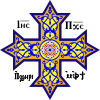
The Coptic Orthodox Church of Alexandria is an Oriental Orthodox Christian church based in Egypt, servicing Africa and the Middle East. The head of the church and the See of Alexandria is the Patriarch of Alexandria on the Holy See of Saint Mark, who also carries the title of Coptic Pope. The See of Alexandria is titular, and today the Coptic Pope presides from Saint Mark's Coptic Orthodox Cathedral in the Abbassia District in Cairo. The church follows the Alexandrian Rite for its liturgy, prayer and devotional patrimony. With approximately 10 million members worldwide, it is the country's largest Christian denomination.
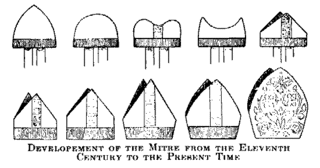
An episcopal polity is a hierarchical form of church governance in which the chief local authorities are called bishops. It is the structure used by many of the major Christian Churches and denominations, such as the Catholic, Eastern Orthodox, Oriental Orthodox, Church of the East, Anglican, and Lutheran churches or denominations, and other churches founded independently from these lineages.

The Patriarch of Alexandria is the archbishop of Alexandria, Egypt. Historically, this office has included the designation "pope".

This article uses dates and years written in the Coptic calendar, using the A.M. calendar era, in addition to the Gregorian calendar, using the A.D. calendar era.
Pope Avilius of Alexandria, was the 3rd Patriarch of Alexandria.
Pope Primus, also called Aprimos, was the 5th Pope and Patriarch of Alexandria.
Pope Julian (Yulianus) of Alexandria was the 11th Pope and Patriarch of Alexandria.

Pope Heraclas was the 13th Pope and Patriarch of Alexandria, reigning 232-248.

The Pope of the Coptic Orthodox Church of Alexandria is the leader of the Coptic Orthodox Church of Alexandria, a faith with ancient Christian roots in Egypt. The current holder of this position is Pope Tawadros II, who was selected as the 118th pope on November 18, 2012.
Pope John X of Alexandria was the 85th Pope of Alexandria and Patriarch of the See of St. Mark.

Pope Demetrius II of Alexandria, 111th Pope of Alexandria & Patriarch of the See of St. Mark.

The Greek Orthodox Patriarchate of Alexandria and all Africa, also known as the Greek Orthodox Church of Alexandria, is an autocephalous patriarchate that is part of the Eastern Orthodox Church. Its seat is in Alexandria and it has canonical responsibility for the entire African continent.
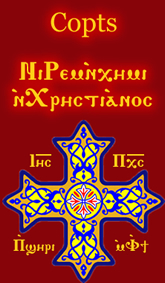
This article, dealing with the Coptic Orthodox Church in Africa, is about the Coptic Orthodox Church of Alexandria in African countries other than Egypt.

Christianity has been, historically a Middle Eastern religion with its origin in Judaism. Eastern Christianity refers collectively to the Christian traditions and churches which developed in the Middle East, Egypt, Asia Minor, the Far East, Balkans, Eastern Europe, Northeastern Africa and southern India over several centuries of religious antiquity. It is contrasted with Western Christianity which developed in Western Europe. As a historical definition the term relates to the earliest Christian communities and their long standing traditions that still exist.

Coptic history is part of history of Egypt that begins with the introduction of Christianity in Egypt in the 1st century AD during the Roman period, and covers the history of the Copts to the present day. Many of the historic items related to Coptic Christianity are on display in many museums around the world and a large number is in the Coptic Museum in Coptic Cairo.
Oriental Orthodoxy is the communion of Eastern Christian Churches that recognize only three ecumenical councils — the First Council of Nicaea, the First Council of Constantinople and the Council of Ephesus. They reject the dogmatic definitions of the Council of Chalcedon. Hence, these Churches are also called Old Oriental Churches or Non-Chalcedonian Churches.

The Oriental Orthodox Churches are a group of Eastern Christian churches adhering to Miaphysite Christology, with a total of approximately 60 million members worldwide. The Oriental Orthodox Churches are broadly part of the trinitarian Nicene Christian tradition shared by today’s mainstream churches, and represent one of its oldest branches.
Articles related to Christianity include:
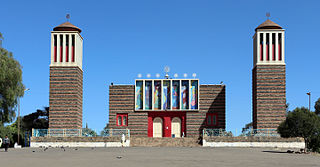
The Eritrean Orthodox Tewahedo Church is an Oriental Orthodox church with its headquarters in Asmara, Eritrea. Its autocephaly was recognised by Shenouda III, Pope of the Coptic Orthodox Church of Alexandria after Eritrea gained its independence from Ethiopia in 1993.
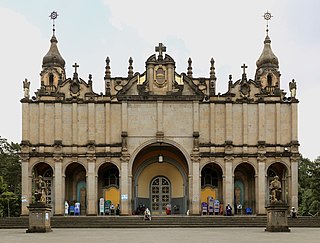
Orthodox Tewahedo is the common and historical name of the Oriental Orthodox jurisdiction in the former Ethiopian Empire, that would later become the Ethiopian Orthodox Tewahedo and Eritrean Orthodox Tewahedo churches.





































